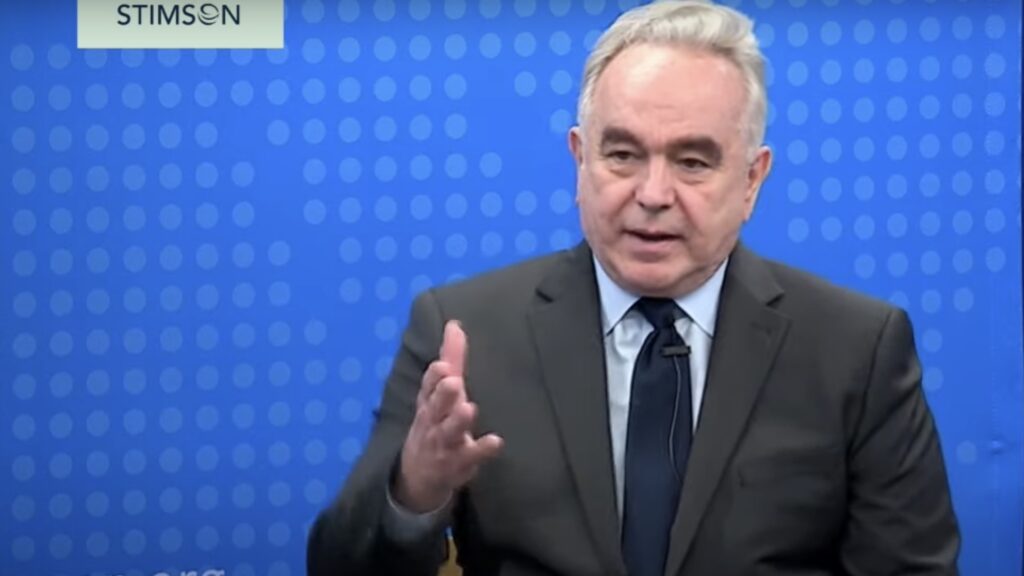
CHICAGO — The United States believes China, despite its recent aggressive conduct in the Philippines and verbal bluster, “is determined to work in a way that stabilizes US-China relations and does not create undue areas of friction and tension that can escalate in ways that are unpredictable and dangerous,” the State Department’s number two official said.
“I would say, at this juncture, the United States and China have taken substantial steps since the Woodside summit to build more arenas of dialogue and discussion and some areas of cooperation between the United States and China and some areas of cooperation,” Deputy Secretary of State Kurt Campbell said Wednesday in an appearance at the Stimson Center, a Washington thinktank. “Woodside summit” refers to President Joe Biden’s meeting with Chinese leader Xi Jinping in California in November.
One of the areas the United States, especially the Pentagon, has pushed hard on is restarting and expanding military to military communication between the two great powers. Campbell said those efforts, which China resisted for years, should start bearing fruit.
“I think the restarting of military efforts aimed at building instruments and starting venues where we can discuss crisis communications to prevent unintended escalation are important steps, and we think that they will bear fruit in the next little while,” he said. “And we believe that China is also invested in trying to head off potential areas of misunderstanding.”
RELATED: After chilly silence, US SecDef, China defense minister hold first talks
It’s important to note that Campbell said none of this means the United States is lowering its careful and extensive efforts to monitor and shape Chinese behavior.
Why does Campbell think the Peoples Republic of China is more interested in a stabIe relationship with the United States than pressing its interests in the South and East China Seas, as evidenced by its repeated threats and physical attacks on Philippine sailors, as well as the well-documented dangerous and unprofessional engagements at sea and in the air between the PLA and the US, Australian and Dutch militaries?
Campbell said that China’s “primary focus is on its economy and seeking to reassure investors and others that they have a plan for the way ahead.” He cited the meetings he and White House Principal Deputy National Security Adviser Jon Finer had at the end of May with China’s Vice Foreign Minister Ma Zhaoxu in Washington.
“At least from those meetings,” he said, “I think we still believe that China is determined to work in a way that stabilizes US-China relations and does not create undue areas of friction and tension that can escalate in ways that are unpredictable and dangerous.”
China’s economy is in a precarious state, with vast public and private debt, much of it tied to the country’s enormous investment in real estate. The COVID pandemic also led to sharp drops in international trade and tourism.
Perhaps because of those economic headwinds, which could lead to instability in the world’s second largest population, Campbell said American tariffs and other restrictions on China are not intended “to somehow limit Chinese economic growth.
“I believe it is an American interests to take careful steps to restrict China’s access to certain technologies that we believe are being used in ways that are antithetical to our interests, usually in the national security realm,” he said. He conceded that the US and other western countries are reacting to Chinese “dumping” electric vehicles when they are faced with “overcapacity in a variety of economic areas.” The European Union announced Wednesday, in fact, that it will impose tariffs of up to 38 percent on EVs, starting in July.
This, he said, is not the first time China has acted this way. “A decade ago, the Chinese took steps both in terms of aluminum and iron and unloaded overcapacity in the United States and elsewhere, which did a lot of harm to our indigenous industries,” he said.
Elsewhere in the talk, Campbell addressed another key area of concern for the US: North Korea. Campbell said it was very difficult to know much about the effects of former President Donald Trump’s meetings with Kim Jong-un, and said more recent diplomatic outreach had been fruitless.
“We’ve had almost no interaction after many attempts between Washington and Pyongyang. We’ve tried a number of venues. We’ve tried through other countries. We’ve sent careful messages about a desire to reengage on issues of critical importance. We’ve talked to them at moments of need and uncertainty about about COVID,” Campbell said. “I think it would be fair to say that we’ve had no luck with any of those diplomatic outreach efforts.”